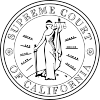| In re Marriage Cases | |
|---|---|
 | |
| Argued March 4, 2008 Decided May 15, 2008 | |
| Full case name | In re MARRIAGE CASES. [Six consolidated appeals.] |
| Citation(s) | 43 Cal. 4th 757 (2008) |
| Case history | |
| Prior history | Judgment for Plaintiffs reversed, 143 Cal.App.4th 873 (2006) [49 Cal.Rptr.3d 675] |
| Subsequent history | Rehearing and Stay of Remittitur Denied June 4, 2008 |
| Holding | |
| |
| Court membership | |
| Chief Justice | Ronald M. George |
| Associate Justices | Joyce L. Kennard, Marvin R. Baxter, Kathryn M. Werdegar, Ming W. Chin, Carlos R. Moreno, Carol A. Corrigan |
| Case opinions | |
| Majority | George, joined by Kennard, Werdegar, Moreno |
| Concurrence | Kennard |
| Concur/dissent | Baxter, joined by Chin |
| Concur/dissent | Corrigan |
| Laws applied | |
| Cal. Const. art. 1 §§ 1, 7, and Cal. Fam. Code §§ 300, 308.5 | |
Superseded by | |
| California Proposition 8 (in part) Note: Proposition 8 was ruled unconstitutional in Hollingsworth v. Perry, restoring the full legal effect of the decision in In re Marriage Cases. | |
In re Marriage Cases, 43 Cal. 4th 757 (Cal. 2008) was a California Supreme Court case where the court held that laws treating classes of persons differently based on sexual orientation should be subject to strict judicial scrutiny, and that an existing statute and initiative measure limiting marriage to opposite-sex couples violate the rights of same-sex couples under the California Constitution and may not be used to preclude them from marrying.[1]
On May 15, 2008, the California Supreme Court ruled in a 4–3 decision that laws directed at gays and lesbians are subject to strict scrutiny and same-sex couples' access to marriage is a fundamental right under Article 1, Section 7 of the California Constitution. The court found that two statutes barring same-sex marriage in California, one enacted in 1977 by the legislature and the other in 2000 by state voters (Proposition 22), were unconstitutional. The decision was the first in the United States to establish sexual orientation as a suspect classification.[2] On June 4, 2008, the court denied a request for rehearing and a request to put a hold on the ruling, affirming that the decision would take effect as scheduled.[3] The writ of mandate directing the state government to comply with the ruling and grant same-sex marriages was issued by the Superior Court of California on June 19, 2008.[4]
On November 4, 2008, California voters approved Proposition 8, which limited marriage under the California Constitution to opposite-sex couples. This decision did not disturb that part of the court's holding that gay men and lesbians constitute a suspect class for purposes of equal protection under Art. I § 7.[5]
The Supreme Court of California joined the Supreme Judicial Court of Massachusetts as the second state to have its highest court rule prohibitions on same-sex marriage unconstitutional, although for somewhat different reasons. Later in 2008, the Connecticut Supreme Court handed down a similar decision, as did the Iowa Supreme Court in April 2009 (see Varnum v. Brien). Before a series of federal court cases occurred striking down various states' prohibition of same-sex marriage, the New Mexico Supreme Court also struck down the state's prohibition of same-sex marriage in a unanimous decision in December 2013.
The judgment In re Marriage Cases was in part mooted by Strauss v. Horton, 46 Cal.4th 364 (2009),[6] which was itself mooted by Hollingsworth v. Perry (2013).
- ^ News Release 26, May 15, 2008, In re Marriage Cases, S147999.
- ^ Dolan, Maura (May 16, 2008). "California Supreme Court overturns gay marriage ban". Los Angeles Times. Retrieved March 25, 2010.
- ^ Egelko, Bob (June 5, 2008). "State high court won't stay same-sex nuptials". San Francisco Chronicle. Retrieved June 5, 2008.
- ^ Egelko, Bob (June 20, 2008). "It's official: No more 'man and woman' in state's marriage law". The San Francisco Chronicle. Retrieved June 20, 2008.
- ^ Cheryl Miller (November 6, 2008). "Prop. 8 puts squeeze on Calif. chief justice". The Recorder.
- ^ For a review of Strauss vs. Horton see: Thomas Kupka, Names and Designations in Law, in: The Journal Jurisprudence 6 (2010) 121-130 Archived 2011-07-06 at the Wayback Machine.
